Intel Core i9-10850K Review: The Real Intel Flagship
by Dr. Ian Cutress on January 4, 2021 9:00 AM EST- Posted in
- CPUs
- Intel
- Core
- Z490
- 10th Gen Core
- Comet Lake
- LGA1200
- i9-10850K
Gaming Tests: F1 2019
The F1 racing games from Codemasters have been popular benchmarks in the tech community, mostly for ease-of-use and that they seem to take advantage of any area of a machine that might be better than another. The 2019 edition of the game features all 21 circuits on the calendar for that year, and includes a range of retro models and DLC focusing on the careers of Alain Prost and Ayrton Senna. Built on the EGO Engine 3.0, the game has been criticized similarly to most annual sports games, by not offering enough season-to-season graphical fidelity updates to make investing in the latest title worth it, however the 2019 edition revamps up the Career mode, with features such as in-season driver swaps coming into the mix. The quality of the graphics this time around is also superb, even at 4K low or 1080p Ultra.
For our test, we put Alex Albon in the Red Bull in position #20, for a dry two-lap race around Austin. We test at the following settings:
- 768p Ultra Low, 1440p Ultra Low, 4K Ultra Low, 1080p Ultra
In terms of automation, F1 2019 has an in-game benchmark that can be called from the command line, and the output file has frame times. We repeat each resolution setting for a minimum of 10 minutes, taking the averages and percentiles.
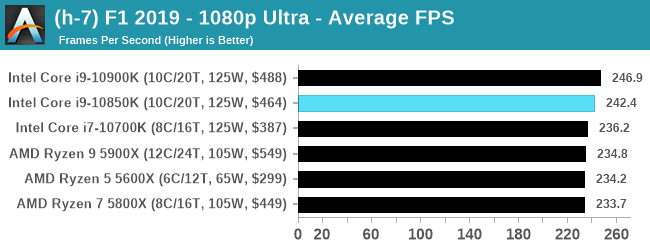
| AnandTech | Low Resolution Low Quality |
Medium Resolution Low Quality |
High Resolution Low Quality |
Medium Resolution Max Quality |
| Average FPS | 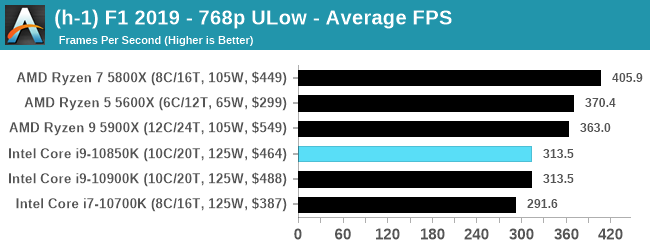 |
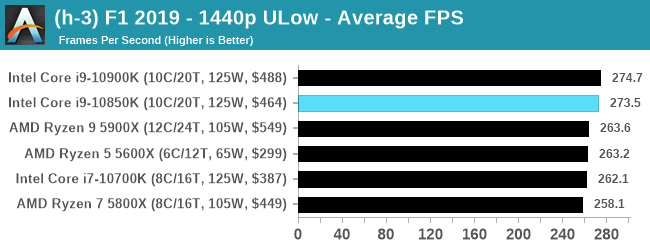 |
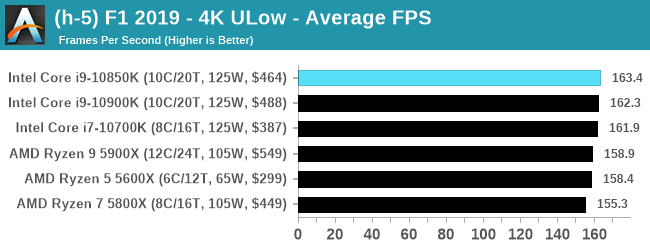 |
 |
| 95th Percentile | 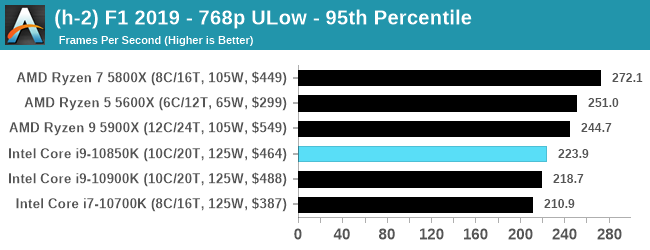 |
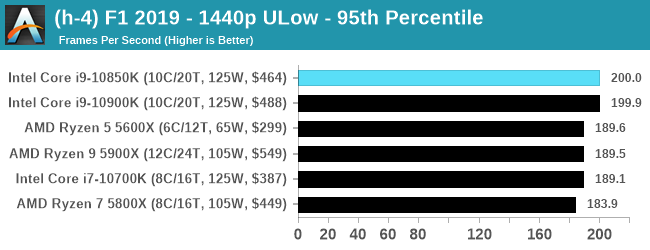 |
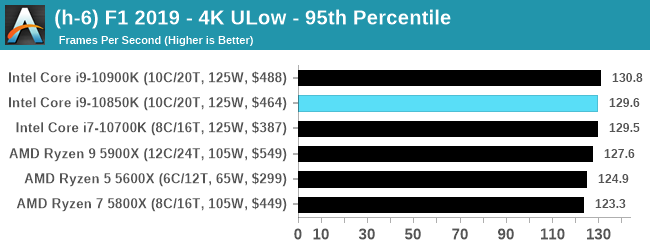 |
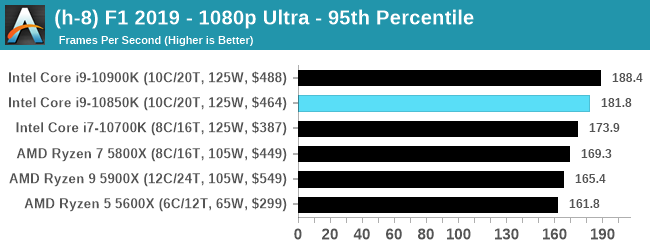 |
All of our benchmark results can also be found in our benchmark engine, Bench.











126 Comments
View All Comments
simpleinhibition - Monday, January 4, 2021 - link
This review is only 6 months after launch. I remember a time when anandtech spent more time doing launch day articles and less time tweetingmrvco - Monday, January 4, 2021 - link
Very diplomatic review, but Intel has become the Dodge of CPUs.Everett F Sargent - Monday, January 4, 2021 - link
"For v2.1, we also have a fully optimized AVX2/AVX512 version, which uses intrinsics to get the best performance out of the software."Hmm, err, none of the CPU's in this review support any of the AVX-512 instruction set afaik.
Pointless to compile explicit AVX-512 instructions or use the AVX-512 compiler flag. We know this because compiling something on an AVX-512 aware CPU will work on an AVX-512 machine but will surely crash on a non-AVX-512 CPU. So the best you can say in this review is that AVX2 was enabled as all of the tested CPU's support AVX2.
Now when Rocket Lake comes out then you have an AVE-512 aware CPU. I really don't care what you all do. But if you are going to use/build custom code then use it in a pure AVE-512 compiled code. Four word versus eight word vectors (assuming 64-bit FP code). That then isolates the AVX-512 advantage which should be ~2X faster (eight/four) afaik.
Everett F Sargent - Monday, January 4, 2021 - link
Oh and the CPU speeds would have the same for all tests. Otherwise you will have to factor in those different CPU clocks. Yes to the slower clocks for AVX2/AVX-512 instructions as per the MHz offsets versus non-vectored code.TeXWiller - Monday, January 4, 2021 - link
Sorry to nit-pick, Ian, but the original definition of the dark silicon was the area of the chip for which there is not enough power or thermal budget to power at the same time as the rest of the chip, instead that of structures that are purposefully added to improve thermal management. The paragraph makes the distinction unclear in my opinion.anarfox - Monday, January 4, 2021 - link
I bit of an overreaction in the comments here. I have one of these with a noctua nh-d15 and it has no problem keeping it cool. And it's not like it have to ramp up the fans either. Is really quiet.An amd cpu might be a better choice of you can get one. But that's not an easy task.
Oxford Guy - Monday, January 4, 2021 - link
‘While these comments make sense, ultimately very few users apply memory profiles (either XMP or other) as they require interaction with the BIOS, and most users will fall back on JEDEC supported speeds’Hogwash.
Ultimately, very few non-enthusiasts read Anandtech. So, citing the people who are not your audience is plain fallacious.
Secondly, no one needs to go to JDEC to gain stability, nor wants to, unless they’re in ECC land. If they didn’t bother to read their motherboard vendor’s supposed RAM list that shouldn’t be a ball and chain around our necks.
Want JDEC? Fine. Do two rounds of tests. Otherwise, stick with the actual sweet spot in terms of price and performance. That is never JDEC.
Oxford Guy - Monday, January 4, 2021 - link
JEDEC, rather. Not even spelling the acronym is par for the course given how irrelevant it is for enthusiasts.As for ‘supposed’, that’s auto-defect.
Dug - Monday, January 4, 2021 - link
"‘While these comments make sense, ultimately very few users apply memory profiles (either XMP or other) as they require interaction with the BIOS, and most users will fall back on JEDEC supported speeds’"Ummmm..... no.
I guess you guys haven't bought a computer in a long time from a vendor. Or even realize that people that do make their own, do apply it because every single guide on youtube, every tech site, every how to blog, shows it. So your assumption is just that, and not realistic.
Dug - Monday, January 4, 2021 - link
And that wasn't directed to anarfox, but Anandtech. No edit in 2021!